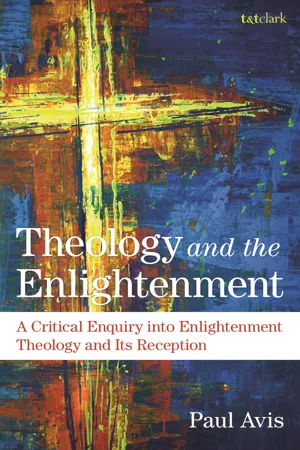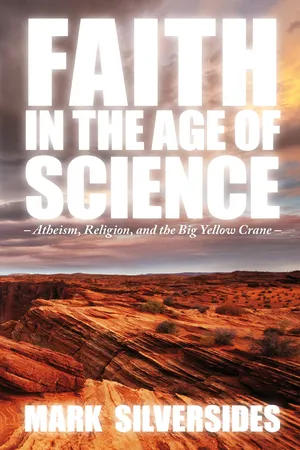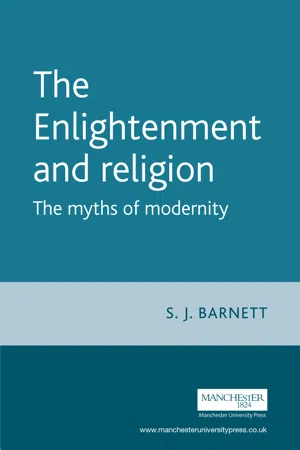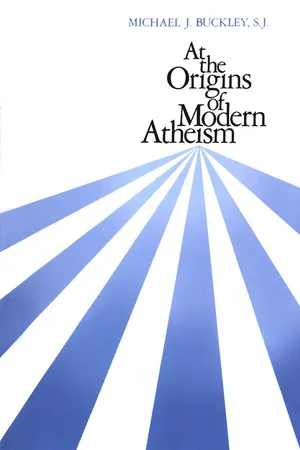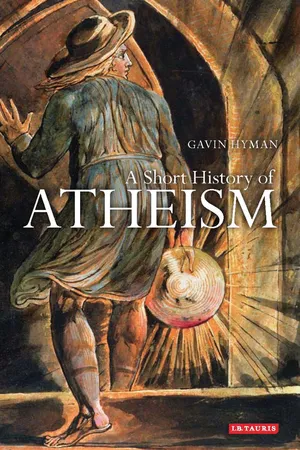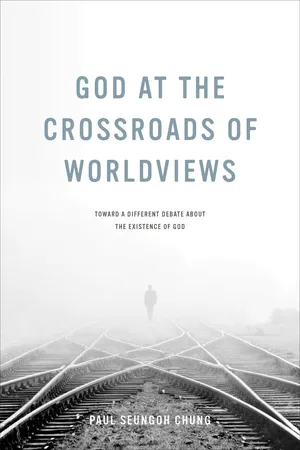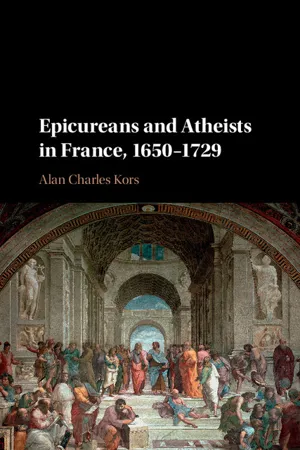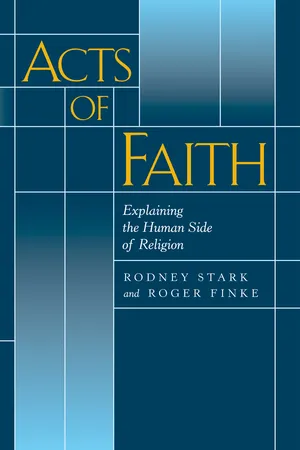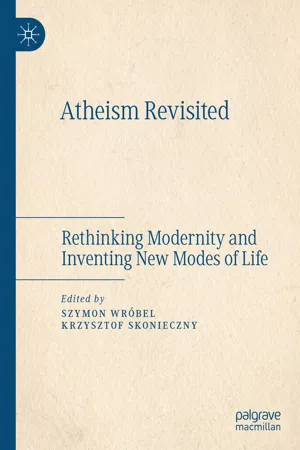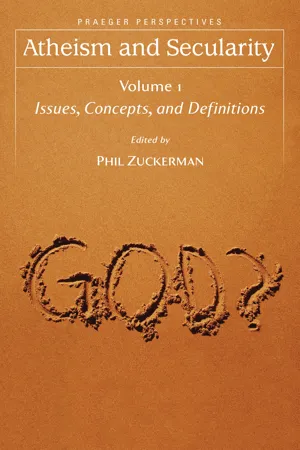History
Atheism in the Enlightenment
Atheism in the Enlightenment refers to the emergence of atheistic thought during the 17th and 18th centuries in Europe. Influenced by scientific and philosophical advancements, Enlightenment thinkers began to question traditional religious beliefs and advocate for secularism and rationalism. This period marked a significant shift in attitudes towards religion and the role of reason in shaping societal values.
Written by Perlego with AI-assistance
Related key terms
1 of 5
11 Key excerpts on "Atheism in the Enlightenment"
- eBook - ePub
- Max Horkheimer, Matthew O'Connell(Authors)
- 2014(Publication Date)
- Verso(Publisher)
Besides, what is called “theism” here has very little in common with the philosophical movement of the seventeenth and eighteenth centuries which went by that name. That movement was mostly an attempt to reconcile the concept of God with the new science of nature in a plausible manner. The longing for something other than this world, the standing-apart from existing conditions played only a subordinate part in it and mostly no part at all. The meanings of the two concepts do not remain unaffected by history, and their changes are infinitely varied. At a time when both the national socialists and the nationalistic communists despised the Christian faith, a man like Robespierre, the disciple of Rousseau, but not a man like Voltaire, would also have become an atheist and declared nationalism as a religion. Nowadays atheism is in fact the attitude of those who follow whatever power happens to be dominant, no matter whether they pay lip-service to a religion or whether they can afford to disavow it openly. On the other hand, those who resist the prevailing wind are trying to hold on to what was once the spiritual basis of the civilization to which they still belong. This is hardly what the philosophical “theists” had in mind: the conception of a divine guarantor of the laws of nature. It is on the contrary the thought of something other than the world, something over which the fixed rules of nature, the perennial source of doom, have no dominion. - eBook - ePub
Theology and the Enlightenment
A Critical Enquiry into Enlightenment Theology and Its Reception
- Paul Avis(Author)
- 2022(Publication Date)
- T&T Clark(Publisher)
The scholastic philosophical theology ‘generated its own antithesis, the possibility of which it had always carried within’. 82 In the seventeenth century, after the philosophical revolution initiated by Descartes, the evidence of ‘atheism’ was more behavioural than cognitive, associated with unorthodox lifestyles rather than with unorthodox beliefs. Until the nineteenth century it was generally held (Bayle, with his notion of the ‘virtuous atheist’ being the great exception), following extensive biblical precedents, that immoral behaviour and any heresy, most of all of course explicit atheism, went hand in hand: the one entailed the other. 83 Kors’s central thesis is that it was fratricidal, internecine, theological controversy, as various philosophical-theological schools of thought demolished each other’s arguments for the existence of God, that taught eighteenth-century readers the possibility of atheism. In a theological context, the charge of ‘atheism’ has often been banded about carelessly and without precision. It has been aimed in a scatter-gun manner at anyone who expressed doubts about any claimed miracle, declined to take every part of the Bible literally, criticized the clergy for their moral failings, or themselves lived profligate lives. Like ‘Communist’ in the 1950s McCarthy era of the United States, ‘atheist’ in the eighteenth century was a term of indiscriminate ideological abuse. It was tinged with paranoia: non-existent Communists/atheists were detected hiding under many a bed. Perhaps it is sufficient to remember that the early Christians were accused of being atheists. Although a lot of noise was made about ‘atheism’, the few actual atheists were essentially irrelevant to eighteenth-century European civilization - eBook - ePub
Faith in the Age of Science
Atheism, Religion, and the Big Yellow Crane
- Mark Silversides(Author)
- 2012(Publication Date)
- Sacristy Press(Publisher)
CHAPTER 1Atheism in Crisis
There have been atheists throughout western history, starting from the pre-socratic philosophers of the sixth century BCE, but generally as a very small minority. Until the eighteenth century the almost infallible rule was that people would follow the religious belief into which they were born, or convert to a different faith, voluntarily or under duress.The atheist viewpoint had greater freedom to develop with the onset of the Enlightenment during the seventeenth century, so that in the eighteenth and nineteenth centuries atheism became more of an option. This modern phase is generally held to start with Baron d’Holbach (1723–89) and a handful of others in the second half of the eighteenth century. D’Holbach was one of the materialists (we shall consider this philosophy in more detail later) who provided the intellectual groundwork for the French Revolution. Julian Baggini in his book Atheism: A Very Short Introduction gives greater detail of what he calls “the birth of avowed atheism” at this time and connects it across the centuries with the pre-socratics as part of an ongoing story, although, as he himself admits, not all authorities would agree with him on this point.Baggini’s book is an excellent introduction to atheism, both concise and constructive, and he may be correct in making a theoretical link with the ancient Greeks. There was also some medieval discussion concerning atheistic views, for example in the works of Peter Abelard (1079–1142). However, for modern readers, atheism in our western culture originated in eighteenth-century Europe.Atheism Today
I suspect that Baggini would not support the belligerence of the extreme Dawkinsians as he seems to be more interested in promoting useful philosophical discussion. In a similar vein, Lewis Wolpert is a card-carrying atheist, but is more conciliatory than aggressive in tone. Martin Rowson, a piercing humorist and author of The Dog Allusion: Gods, Pets and How to Be Human thinks it would be better just to pat religion on the head and leave it alone in its basket to gnaw on its leg. Hopefully, this might keep it out of politics, a wish also expressed (at least most of the time) by commentators such as the late Christopher Hitchens. Like The God Delusion - eBook - ePub
The Enlightenment and religion
The myths of modernity
- S. Barnett(Author)
- 2013(Publication Date)
- Manchester University Press(Publisher)
63 As we shall see, a text’s notoriety for atheism or atheistic tendencies should not be understood as a necessary indicator of its potential or actual influence, but rather or equally as an indicator of its highly unusual and unrepresentative nature, and as a product of fashionable scandal-mongering. There was always a certain audience prepared to be titillated by outrages in print, but whether they themselves held to those ideas is of course a very different question. Thus, what have often been regarded as transparent indicators of radicalism can equally be seen as just the reverse.So, the problem facing Enlightenment studies is that the revision away from the reason-versus-religion thesis has arguably included insufficient reassessment of the historical record from which historians (at least in part) make their generalizations. Similarly, the ideological position of deism as a factor in early modern Europe has been subject to little specific discussion, rather remaining at the level of often vague generalization or inference from specific cases. One of the aims running through this book, then, is to discuss how one might go about considering such a revision – the central questions, contexts, problems and methodology. In this respect, we are immediately confronted with important methodological and philosophical considerations, the necessarily first of which is whether the ‘reality’ of eighteenth-century Europe is (as we are told by postmodernists) merely a series of competing tales told by professional historians?My short answer is no. Indeed, if it were possible in this book, I would like to assert that my aim is to reflect on eighteenth-century reality . My deceptively simple aspiration cannot be realized on account of the long-held understanding of some historians that there was not one unified eighteenth-century reality any more than there is any one unified present reality. If we accept that those who lived in the eighteenth century often had disagreements on the nature of their present, why on earth should historians imagine that the writings of a tiny minority of elite but often divided writers can form any straightforward guide to that century? The great scientist Joseph Priestley, for instance, noted that, ‘being a Unitarian’, he disagreed with the historical interpretations of Trinitarians,64 even ‘when there is no dispute about the facts’.65 - eBook - PDF
- Barry Kernfeld(Author)
- 1992(Publication Date)
- Yale University Press(Publisher)
It was a revival; its names were standard names of antiquity. Atheism was seen not so Religion as Bankrupt 47 much as a state of Europe nor as an atmosphere within it, but as a vector, whose initial stages were identified not with the new science but with the disintegration of a common religious confession sustained by a teaching Church. The denial of authority within religion was the initial moment of this development, Lessius wrote, and the skepticism embodied in the soph-ists and in the Third Academy, and, more important, the immanent mater-ialism of the Epicureans could provide fuel for its fires. Atheism was in an early renaissance. 33 This makes somewhat intelligible the tack that De providentia numinis takes: the arguments which Lessius uses and the evidence to which he alludes are also from the classical philosophers. To deal with a putative atheism, Lessius steps back over almost fifteen hundred years of Christian theology as if these centuries had left no mark upon European conscious-ness, and revives the arguments of ancient, pagan masters. The typical atheists are the ancient philosophers. So atheism in the sixteenth and seventeenth centuries is treated as if it were a philosophic issue, rather than a religious one; this shift characterizes Catholic apologetics for the succeeding four hundred years. The demonstration of the reality of god can proceed from rationes philosophicae—but the obvious ones, leaving out those which are more obscure and which can be explored in the Metaphysics** This locates the ultimate foundations or sanction of moral life, which in Europe had been traditionally the province of religion and the object of preachers, within philosophy. Atheism is taken as if it were simply a matter of retrieving the philosophical positions of the past, rather than a profound and current rejection of the meaning and reality of Jesus Christ. Christology has become irrelevant in establishing the reality of god. - eBook - ePub
- Gavin Hyman(Author)
- 2010(Publication Date)
- I.B. Tauris(Publisher)
Chapter 1The ‘Appearance’ of Atheism in Modern History
In any discussion of the ‘appearance’ of atheism in the West, it is important to distinguish between two distinct spheres in which this occurred. On the one hand, it is possible to trace the emergence and development of atheism in modern thought as an intellectual phenomenon among writers, philosophers, artists and other elites. On the other hand, one may trace a parallel development of atheism in history as a cultural phenomenon, whereby atheism becomes a possible option, a viable world-view, whether for society as a whole or for groups or individuals within societies. To trace the contours of both these developments is to tell two quite distinct stories, each with their own beginnings and histories. There may be parallels and points of contact between them, but the time and manner of their respective developments are quite distinct.It is also worth noting at this point that the story of the appearance of atheism is part of a wider story of the appearance of ‘unbelief’ in relation to Christianity. For, as we shall see, atheism is but one species of unbelief that emerged alongside, or in reaction against, other forms such as scepticism, ‘free thinking’ and, later, agnosticism. All these varieties of unbelief have their own distinct characteristics, but they are all part of a wider story of the gradual weakening of the hold of Christian orthodoxy on Western thought and Western society in general. As Charles Taylor has recently emphasised, there has been a remarkable shift in Western society, the revolutionary character of which is not always fully appreciated.1 - eBook - ePub
God at the Crossroads of Worldviews
Toward a Different Debate about the Existence of God
- Paul Seungoh Chung(Author)
- 2016(Publication Date)
- University of Notre Dame Press(Publisher)
Again, I emphasize here that this is one particular strand from a complex weave of numerous historical and intellectual developments, which constitute the narrative of the Enlightenment and the modern age. I seek here only to raise one simple point. That is, the atheist position emerged not by simply rejecting—let alone by “simply not affirming”—belief in the existence of God, but as a result of a number of intellectual formulations and justifications of particular theological or philosophical positions, primarily in a theist—and more specifically, Christian—worldview after Aquinas. More precisely, that there were such particular steps in the complex tapestry of events that form the narrative of the Enlightenment makes untenable any simplistic account of atheism as a position which “simply does not affirm” the postulation of an unwarranted entity. Thus, at this point I acknowledge that the historical account I will present in this chapter will be far from adequate, even regarding the particular strand of the development that I will follow. However, my primary purpose here will be accomplished unless a rival account can somehow refute that such concrete and historically contingent steps—some of which I will identify in this chapter—were present in the historical development of modern atheism.THE CONSTRUCTION OF THE DENIAL THAT GOD EXISTS The Emergence of “Neutral” RationalityThe Enlightenment and its epistemological project remains an important influence for the development of the modern atheist position. This is the claim, as we have seen, that there is a neutral viewpoint completely independent of any sociocultural, historical, or philosophical background or assumptions, from and with which to rationally evaluate every knowledge claim, for any position, for all time. Such a viewpoint claims to perform such evaluations by ensuring that each knowledge claim is supported adequately by the “foundation” of knowledge, which will be composed only of what is indubitable, namely what is incorrigible, self-evident, or evident to the senses. Since belief that God exists is not “indubitable” in this way, the existence of God must be demonstrated from or supported by this foundation of knowledge, as with any other belief that is not a part of the foundation. Thus, a “default” intellectual position, which is initially composed only of such foundational, indubitable claims, is atheist insofar as the foundation does not include belief in God. It is to this position that theists must present their proofs or evidence. Of course, those who hold this classical foundationalist epistemology regarding the existence of God are not necessarily atheists; historically, most were not. A theist may believe that though the existence of God is not a part of the indubitable “foundation,” it may nevertheless be proved by an argument from such foundation. - eBook - PDF
- Alan Charles Kors(Author)
- 2016(Publication Date)
- Cambridge University Press(Publisher)
When does belief in a single substance of the world, in materialism, in determinism, or in various views of providence become “atheism”? These current debates are far, far more than semantic, and they touch astutely and deeply upon the foundations and logical implications of ways of thinking. Let me be plain then, about my own histori- cal use of “atheism” here, believing its meaning to reflect the decisive stake in the deepest contestations and dilemmas of seventeenth- and eighteenth-century French intellectual life. There arose, in the late seventeenth and early eighteenth Epicureans and Atheists 140 centuries, authors who rejected all proofs of God and who explicitly proclaimed and embraced a belief that we inhabited an undesigned, unplanned universe, the product of unthinking matter and fortuitous accident, not of perfect being, intel- ligence, or intention. Those authors believed that we indeed found ourselves left to our own devices and expedients in a world that reflected no wisdom and no love of us. One debate about what is or is not atheism, focused on the issue of “panthe- ism,” raises significant questions for this study. The use of the term “pantheism,” however, brushes closely against the borders of anachronism. The designation of “pantheism” is a common current category, but it was extremely rare in the seventeenth or early eighteenth century. It appears to have been first devised by Joseph Raphson, a sorely neglected member of the Royal Society, eminent mathe- matician, natural philosopher, and active colleague of and collaborator with Isaac Newton. In his De spatio reali (1697), Raphson used the terms “pantheismus” and “pantheos.” For Raphson, there were among the ancient philosophers those who “not improperly can be termed ‘panhylists.’ ” They believed that “nothing but matter” was the universal substance. - eBook - PDF
Acts of Faith
Explaining the Human Side of Religion
- Rodney Stark, Roger Finke(Authors)
- 2000(Publication Date)
- University of California Press(Publisher)
In this introduction, we first summarize the intellectual history of the social scientific study of religion as atheism, tracing the links through major scholars across the centuries. Then we examine the recent shift toward a more truly sci-entific approach, documenting the fact that this transformation was mainly the result of the increased participation of persons of faith. Against this back-ground, we note “survivals” of the traditional atheistic biases, albeit in a some-what muffled form, and seek to show that a scientific study of religion is entirely possible for both believers and unbelievers, if not perhaps for aggressive ideo-logues of either commitment. Finally, we offer an overview of the remaining chapters. WHEN ATHEISM WENT PUBLIC At the start of the English Civil War, with Leviathan written but not yet pub-lished, Hobbes fled London for Paris. This was the first of several Paris sojourns to evade punishment for his views—by Oliver Cromwell for his defense of monarchy and by the Royalists for his attacks on religion. However, Hobbes’s political difficulties ended in , when the Restoration placed Charles II on the English throne, for Hobbes had been the new king’s boyhood tutor, and Charles was sympathetic to his views. Indeed, under Charles II, an intellectual climate favorable to irreligion flourished in England, which has continued ever since, perhaps culminating in the spectacle of Anglican bishops ridiculing belief in “the Old Man in the sky” (see Robinson ), while a Cambridge theolo-gian (Cupitt ) is praised in the Times Literary Supplement by another British theologian (Nineham ) for dismissing “God” as pure subjectivity. When Voltaire spent three years in England (–), he was startled by the open and widespread atheism there, remarking, “In France I am looked upon as having too little religion; in England as having too much.” Similarly, Mon-tesquieu reported from England in , “There is no religion in England ... - eBook - ePub
Atheism Revisited
Rethinking Modernity and Inventing New Modes of Life
- Szymon Wróbel, Krzysztof Skonieczny, Szymon Wróbel, Krzysztof Skonieczny(Authors)
- 2020(Publication Date)
- Palgrave Macmillan(Publisher)
fundamentalism , which can be found both in religious and atheist milieus.In particular, we would like to rethink three significant issues. First of all, we ask: what is atheism and, in a more philosophical sense, if philosophy is understood (via Gilles Deleuze and Félix Guattari ) as creating concepts, what is the “atheism of the concept”? We believe it is worth returning to the relationship between the three following concepts: atheism, pantheism and deism . Spinoza —an avowed atheist—wrote and thought about God far more than about anything else. Should we follow him, and scrutinize the implications of theism, pantheism and deism in the context of contemporary post-Spinozan theory? What is “positive atheism ” today? Gilles Deleuze , when wondering if there is a Christian philosophy , responds: theological thinking only creates concepts on the grounds of its own atheism. It is atheism, rather than religion, that creates concepts (Deleuze and Guattari 2015 ). Thus, Spinoza himself had to become an atheist to create concepts—including the concept of religion. For philosophers, the very “concept of atheism” is also problematic. It is surprising that some of the contemporary discussions concerning the philosophy of Jacques Derrida concentrate on the “alleged atheism” or “uncertain messianism”, or finally the “radical atheism ” (Hägglund 2008 ), of the author of Of Grammatology . The issue of atheism is also crucial in theorizing democratic political power . How is democracy atheist? Does absolutism need religion? These questions, which are important in the context of the theoretical projects of Carl Schmitt , Jürgen Habermas , Jacques Derrida and Giorgio - eBook - PDF
Atheism and Secularity
[2 volumes]
- Phil Zuckerman(Author)
- 2009(Publication Date)
- Praeger(Publisher)
By excavating elements of Colonial and Revolutionary America, nineteenth-century intellectuals, and twentieth-century nonconformists (and regressive trends), I will illustrate how an oft-hidden nontheistic world impacted the development of American history. The bulk of this chapter will be devoted to the grand American myth of national religiosity and fabled origins. That battle begins with the Pilgrims and ends with the death of the founders, and its details deserve special attention. In 1987, President George H. W. Bush proclaimed his unofficial doctrine on the issue of atheists in American culture. When posed with a question on the atheists’ civil rights, he retorted, ‘‘I don’t know that atheists should be considered as citizens, nor should they be considered patriots. This is one nation under God.’’ Such marginalization has been standard fare for atheists as evidenced in some of the earliest written histories of North America. More of a criminal charge than a description of one’s belief, the accusation of atheism was as misused in early America as ‘‘communist’’ and ‘‘terrorist’’ have been in the last sixty years. Now, historically speak- ing, one must be clear about what constituted atheism before the mid- nineteenth century. As James Turner argues in Without God, Without Creed, atheism in America before the Civil War was essentially unheard of. Much of the worldview of preindustrial people was anchored in the notion that the earth was the product of a creator. 1 With the influence of rational Enlightenment thought in the eighteenth century, this view shifted towards a god of nature and away from a Christian god, but was usually confined to an educated elite. That true atheists were as common as uni- corns in early America hardly stopped accusations of disbelief. These charges also illustrate the limited spectrum of acceptable religious expres- sion and suggest the often dire consequences of such pronouncements.
Index pages curate the most relevant extracts from our library of academic textbooks. They’ve been created using an in-house natural language model (NLM), each adding context and meaning to key research topics.

